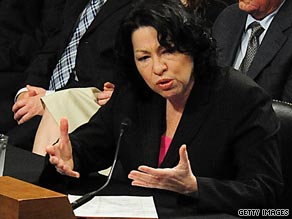
It is interesting for me to watch the Sotomoayor confirmation hearings while I’m working on a manuscript on multiculturalism. I think the whole “Wise Latina” imbroglio could be clarified by a look at Charles Taylor’s classic essay on the politics of recognition. In it, he emphasizes the great psychic harm done to individuals who are misrecognized in a society:
misrecognition shows not just a lack of due respect. It can inflict a grevious wound, saddling its victims with a crippling self-hatred. Due recognition is not just a courtesy we owe people. it is a vital human need.
This misrecognition causes damage becuase we are dialogical in our identity formation (i.e. reading cues from others in making assessments of our own self worth). This reality has led us politically towards the affirmation of a discourse of recognition where we actively seek to address misrecognition in our society. Sotomayor’s explanation of her “wise Latina” comments in her testimony on Tuesday suggests an effort on her part to combat this idea of misrecognition — that Latino/a’s are not capable of being lawyers and judges.
The pushback to Sotomayor on the right occurs because, as Talyor highlights in his essay, a politics of recognition has come to mean two distinct things. One one hand recognition can be defined as the recognition of commonality — the idea that we are all worth of equal dignity. This universality approach to the politics of recognition has been embraced by the right, at least rhetorically. The inference is that we in public life should emphasize our commonality.
Sotomayor’s response was to invoke a second way of thinking about the politics of recognition (i.e. group differences are valuable in public discourse and should be encouraged). Here’s her defense of her comments:
I think life experiences generally, whether it’s that I’m a Latina or was a state prosecutor or have been a commercial litigator or been a trial judge and an appellate judge, that the mixture of all of those things, the amalgam of them help me to listen and understand.
Or as Taylor puts it:
with the politics of difference, what we are asked to recognize is the unique identity of this individual or group, their distinctiveness from everyone else. The idea is that it is precisely this distinctness that has been ignored, glossed over, assimilated to a dominant or majority identity. And this assimilation is the cardinal sin against the ideal of authenticity.
Of course when put in the harsh spotlight of American political theater, Sotomayor seemingly did what most smart people do — she retreated to what is politically expedient and in the American context, a politics of difference is not politically viable. Here’s her response to Sen. Pat Leahy’s question on the “wise Latina” issue:
“I want to state upfront, unequivocally and without doubt: I do not believe that any racial, ethnic or gender group has an advantage in sound judging,” Sotomayor said. “I do believe that every person has an equal opportunity to be a good and wise judge, regardless of their background or life experiences.”
Sounds very universalistic to me. But in thinking about it more, I’ve decided that she’s not walking anything back, but rather she believes both things.
This multiculturalism stuff is sticky business. While both a universalist and particuarlistic claim originate from the same universality place, (all people deserve human dignity, all people have distinct identities worthy of recognition), they produce distinctly different outcomes. While a universality stance is blind to group differences, a politics of difference calls for additional benefits/concessions for specific groups (Quebecquois, Aboriginal peoples, etc.)
The trick, I think, is being able to hold both concepts in your head simultaneously. There are spaces where universalism is appropriate and there are spaces where particularity is appropriate. The challenge is figuring out where those spaces are. it is kinda cool that this is even coming up as a point of contention in American politics more frequently.

Comments 1
ThickCulture » More on Mis-recognition — July 22, 2009
[...] few posts back, I talked about Charles Taylor’s view of multiculturalism as a proposed remedy to the ill of [...]